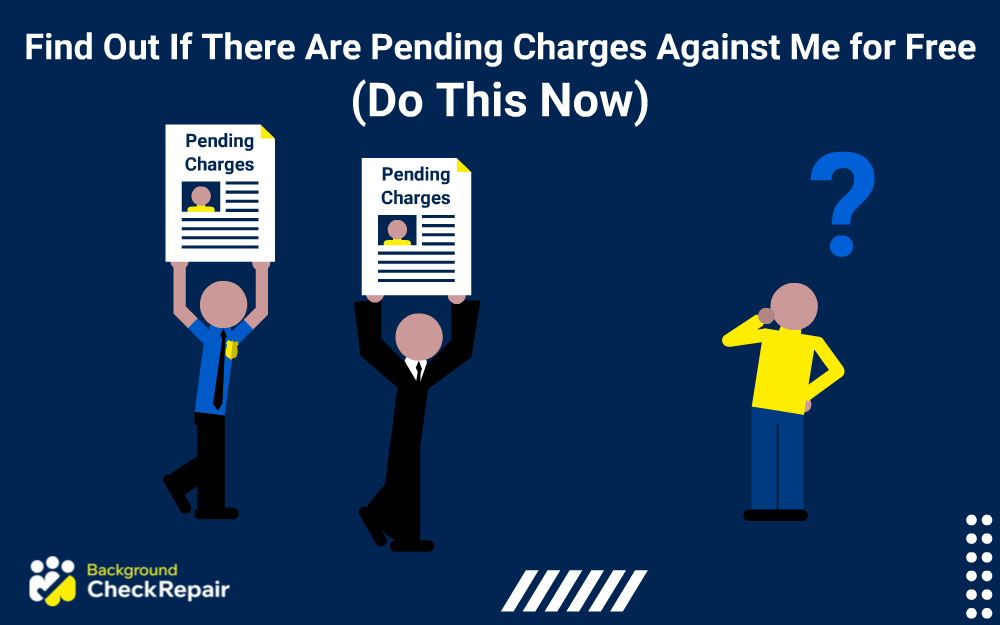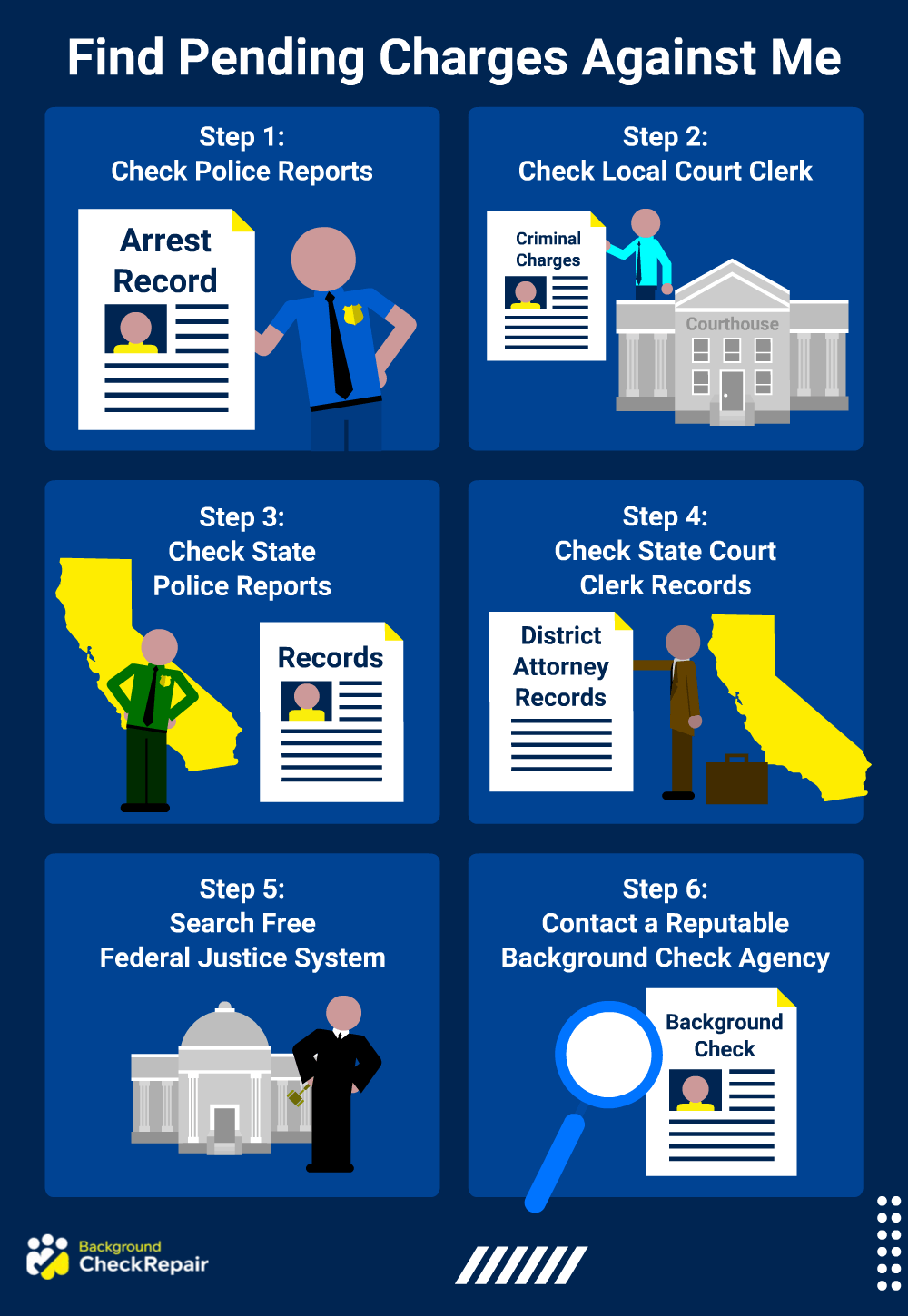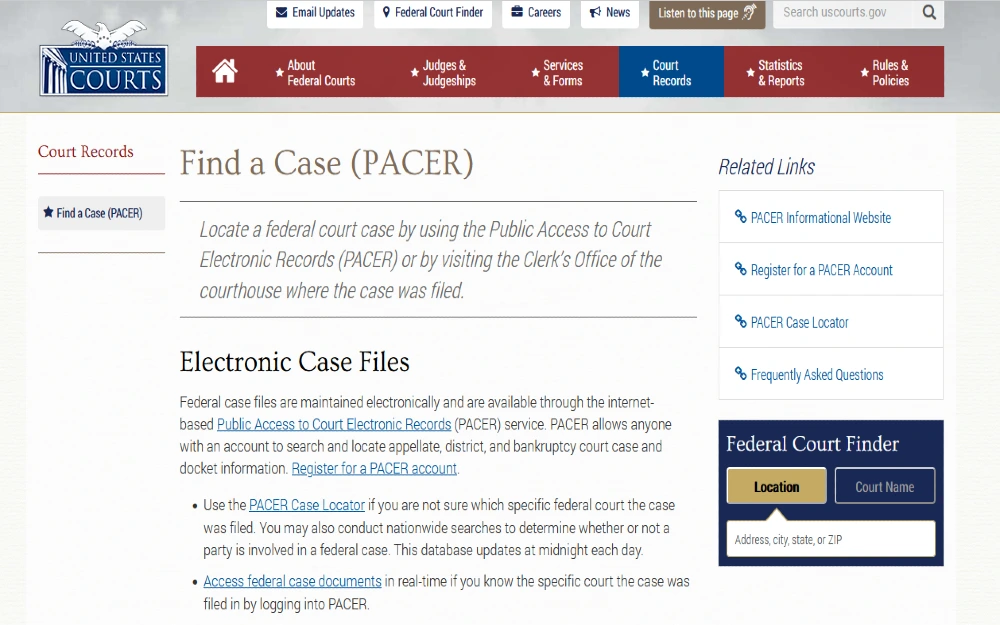
After an incident with law enforcement and before a background check, many people wonder ‘how to find out if there are pending charges against me for free?’
Not knowing if there are pending charges can be a scary thing and although a lawyer may be able to provide useful information, they can be expensive. Especially if there’s the possibility that there is nothing to worry about.
Individuals who need to know how to find out if there are pending charges against me for free, thankfully, have a few options at their disposal that can be done… right now.
Find Pending Charges Against Me
There are a number of ways to find pending charges (court cases) on a background check for free (or a small processing fee). These methods take advantage of the freedom of information act and various other laws that require certain court records and proceedings be made available to the public.

It’s important to keep in mind that although most jurisdictions allow anyone to access this information, based on the jurisdiction there may be additional laws or obstacles that may make the process slightly more difficult.
For example, although many records are available online through a searchable database, in some counties and cities the records are only kept as physical copies. In this case, the way to find out if there are pending charges against you for free involves a trip to the local courthouse.
What About Pending Charges from a Secret Indictment?
There is also the potential that the charges being searched for are part of a secret or sealed indictment. A sealed indictment is when a grand jury decides to indict someone, but for various reasons it is deemed necessary that this indictment remain a secret until the arrest has been made.
Although uncommon, it does happen and if the indictment is secret, there will be no way to confirm if there are any pending charges until the charges are made public and an arrest is made, which usually happens at the same time.
Step 1: Check Police Reports (How to Find Out if a Police Report Was Filed Against You)
The first place to check for those trying to answer the question of “how to find out if there are pending charges against me for free,” is through the local police department. In most jurisdictions police reports and arrest records are included under the Freedom of Information Act, and many are considered public records.
This means that the general public has a right to view these documents at any time. Unfortunately, not all police reports will be available to the general public for a few different reasons.
The first being that the police report is part of an on-going investigation. If the release of certain information runs the risk of the case being jeopardized then that information will not be made available to the public until the case has been closed. In certain circumstances the initial police reports will be available, such as the report that shows police responded to a disturbance, but further information will not be available.
In some cases ongoing investigations will allow police reports to be released to those involved in the case. In this situation those named in the case will have special access to the documents, but the general public will not.
How to Check Police Reports
The process for checking local police reports to find out information about a potential pending charge is relatively simple. However, the process is slightly different based on the jurisdiction’s laws and whether or not they have an online record keeping system.
Step 1: Access the Website of the Local Police Department
The first step, no matter the jurisdiction, is to check the website of the police department where the event, that could have resulted in a pending charge, took place.
On the website for the police department, there should be a section about requesting various kinds of records. Look for the following terms to identify the records department:
- Request Records
- Records Department
- Freedom of Information Act Request
- Record Services Unit
- Police Department Services
Locating a link using any of the above phrases should take users to a page with more information for how to request the desired information.
For example, the San Francisco Police Department website has a “Request a Police Report,” link under the “Get Services,” drop down menu on the website’s home page.
Step 2: Make a Records Request
Most police departments will require that the individual make a formal records request, which will then be fulfilled by the department staff. In general these requests can be made in a number of different ways.
The first and most common method for completing the request is to go to the police department headquarters and make the request in person, usually by giving a name to the clerk that will complete the request. This type of search can often be done by calling the police department, which can be especially useful for individuals requesting information in a city that they do not reside in. Almost all police departments will have procedures in place to handle this kind of request.
The next option is to make the request via email. The records request page on each police department’s website will likely have information on how to submit a request via email. The process usually involves emailing the records department with an email address that should be provided. In most cases, the name of an individual will be sufficient information to complete a request.
The final option, which is also the least common, is to complete a request online. This will vary from one department to another but oftentimes the records page of the website will have an online form that can be filled out and submitted through the website. In some cases the form must be printed and mailed or at the very least downloaded and emailed to a provided address.
Keep in mind that for all these requests, a small fee is often required to obtain a copy of the requested information. The fee is usually below $20 per report.
For example, the San Francisco Police Department record request page lists all of the above options as ways to obtain records.
Clicking the “request a police incident report copy,” link will take users to an online request form that can be filled out. Although not common, the San Francisco Police Department does not require payment to receive copies of records.
Step 2. Check Local Court Clerk (How To Find Out If Criminal Charges Were Filed)
Besides checking police reports, there is also the option to check local court records for any information for potential charges or potential pending charges. Anytime formal charges are made against an individual who is believed to have committed a crime, the charges are filed by the prosecutor through the local court system.
This means that there should be some kind of record that charges were filed available at the courthouse where they were filed.
The process for checking local court clerk records to answer the question of “how to find out if there are pending charges against me for free,” is fairly similar to checking police reports for information.
Detailed steps for checking local court records are outlined below.
Step 1: Access the Website for the Local Court or Local Court Clerk
Finding the local criminal court website is usually as simple as googling: “[County name] Court Clerk.”
For example a search for the court clerk in Nashville, or Davidson county will turn up the website for the Criminal Court of Metropolitan Nashville and Davidson County.
Step 2: Locate the Records Department or Case Search
Depending on the court, they may have an online case search or case lookup function on their website. This is usually a searchable database that only requires the name of an individual, but with a middle name, searchers have better results. .
For example, the Nashville Court Clerk website has a link to “Case Search Information,” which will take users to a database where individuals can use names, case numbers, or incident numbers to search for records. Searches return the results instantly.
Keep in mind that the online searches will not return sealed information, such as a secret indictment. However, any other court documents should be accessible through these databases.
For courts that do not have an online database there are usually two other options:
- Contact the clerk via phone or email to complete the search
- Visit the court clerk in person
Both of these options are extremely common and can usually be done by the court clerk even if there is an online searchable database available. Just like with the online search option, usually the name or case number is sufficient information for the court clerk to perform the search.
As with police department records requests some court clerks will charge a small fee for copies of the requested information.
Step 3. Check State Police Reports
State police records can be another useful source of information where information on potential pending changes can be found. However, it is slightly less reliable than going through the court clerk of the local police department as most if not all the information being requested can already be found through those sources.
Step 1: Access the State Police website
Although some state police departments will have their own dedicated website, many state police department websites are part of the Department of Justice website or a similar branch, such as the attorney general, depending on the state.
For example a search of “California state police,” will take users to the California Attorney General website.
Step 2: Access Record Keeping Information for the State Police
Although some state police departments have their own records department, most often another agency related to the state police will be in charge of the records. In California, this information is found on the attorney general’s website, but the records are maintained by the California Department of Justice.
Step 3: Follow State Specific Guidelines to Request Records
Since each state has a slightly different method for keeping state police records, each state will have a slightly different process for making the request. As with local police and local courts, the most dependable way to request records is to make a formal written request.
For example in California, records requests are made through a public records coordinator, which can be done by filling out the provided online form.
Step 4. Check State Court Clerk Records (How to Find Out if the DA Has Filed Charges)
Checking state court records can also be a useful tool to determine if there are pending charges against an individual. This has the added benefit of being able to easily search multiple courts quickly, in case the jurisdiction of the crime is unknown.
The process is the same as the above but instead of searching at a local level, state court websites will be utilized to find more information.
For example, in California, the California Courts website has a “access to records,” page where detailed information for how to request records across various California courts can be found, as well as the form to submit a request for judicial administrative records.
Step 5. Search Free Federal Justice System Records
Searching Federal justice system records should be the last step when trying to answer “How to find out if there are pending charges against me for free.” If it is possible that the charge is part of a federal case, then information for it should be available through the United States Courts records. The U.S. courts use a system called PACER to search for federal court case information. The service is free but requires an account to be made in order to perform the search.

It is free to lookup criminal court cases and charges on the federal PACER website, but users must create an account to gain access to the search feature.1
The Public Access to Court Electronic Records system (PACER) also has the option to perform a case search, for individuals that are unsure which court that a case was filed in.
Simply make an account and follow the simple on screen prompts to perform the search.
Using a free trial service from a reputable background check agency can be the fastest answer for how to find out if there are pending charges against me for free. With a free background check trial, these companies perform the full criminal history search, and can return a report swiftly.
Will The Police Notify Me of Charges Filed?
The police will usually notify individuals of filed charges as soon as they are filed, but the notification can depend on the police charge window timeframe. For misdemeanors, the notification will be sent by mail. Felony charges will result in a warrant being issued and an arrest being made as soon as possible. That is why it is critical to conduct a search on federal warrants yourself before possibly being arrested.
If a sealed indictment is made, police will not notify the individual that charges have been filed. Instead, the individual will be arrested.
How Criminal Cases Work in Most States
Criminal cases in the United States can take weeks, months or even years but all follow the same steps:
- A crime is committed & investigated (If police believe a crime has been committed they will investigate and report their findings to the prosecutor)
- Charges are filed (Prosecutor files charges if they believe a crime has taken place)
- Arraignment (Defendant pleads guilty or not guilty before a judge)
- Trial (If Defendant pleaded not guilty a criminal trial before a jury is held)
- Sentencing (If the defendant is convicted of a crime during the trial a sentencing hearing is held to determine the length of the sentence)
- Appeals (After the sentencing, appeals may be made to overturn the results of the trial or sentencing)
As far as the question “how to find out if there are pending charges against me for free,” there are a number of free options available; and although it’s possible that there is a sealed indictment which can not be found, using free resources that are available should help individuals gain valuable information about the possibility of a pending charge.




